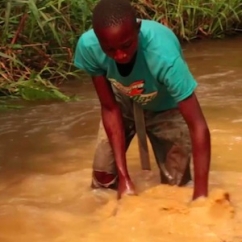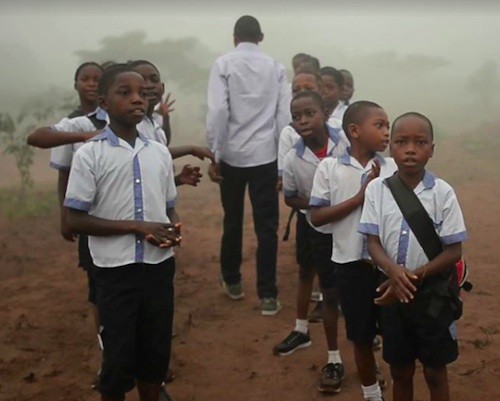Articles and News
TIME Magazine Exposé Brings Blood Diamonds To Fore Again; Diamond Empowerment Fund Responds | September 16, 2015 (0 comments)

New York, NY—Amid a global decline in sales, the diamond industry was just dished up another helping of bad news: a stinging exposé in Time magazine about the lives of alluvial diamond diggers in certain regions of Africa.
The diamond industry is already scrambling to reverse the tide of declining interest in its product, especially among Millennials. To make matters worse, the Time article (“Blood Diamonds," September 7) punches the industry hard again where it’s most vulnerable: social responsibility. Millennial consumers place a very high premium on social responsibility, and while the industry made significant progress after the conflict diamond situation in Sierra Leone, it still has far to go to satisfy the demands of consumers who want to know where everything comes from.
In short, blood diamonds may not always be front-page news, but they’re still very much on the minds of would-be consumers. (“Blood Diamonds” made the cover of Time’s international edition, but the U.S. edition featured comedian Stephen Colbert on the cover.)
The Diamond Empowerment Fund (D.E.F.), whose motto is “Diamonds Do Good” through its initiatives to fund education in diamond producing nations, responded to the Time article with an open letter to the magazine highlighting the positive impact the diamond industry has had in Africa (text at bottom of page).
The Kimberley Process instituted in 2003 following the conflict in Sierra Leone was a good start to eradicating blood diamonds, but even the jewelry industry knows it’s not a complete solution. Its very limited scope—diamonds used to fund rebel groups attempting to overthrow the state—doesn’t cover human rights abuses by mine owners or by governments against their own people, such as happened in Zimbabwe. Industry efforts to broaden it, while popular among Western nations, have met with resistance from other members (such as Russia, China and Zimbabwe) who object to some of the suggested provisions.
To date, despite more than a decade of discussion, the industry is no closer to revising its scope, though an industry summit planned for March 2016 hopefully will produce the necessary changes. All the while, however, consumers don’t make distinctions between bad guys: all human rights abuses, no matter who commits them, are enough to nix the idea of buying a diamond.
The poor working conditions under which alluvial diggers labor is no secret in the industry. The Diamond Development Initiative (DDI) was established to improve conditions and the lives of alluvial diggers, while D.E.F. made a recent donation to help establish a school for alluvial diggers’ children in the DRC.

Children of alluvial diamond diggers attending school in the Democratic Republic of Congo, funded in part by the Diamond Empowerment Fund. Images above and top of page: TIME magazine
To its credit, the Time article does acknowledge that boycotting diamonds would do more harm than good. Meager as compensation is for the diggers, it is all that stands between starvation and sustenance for their families. The article also emphasizes that these conditions are not universal among diamond-producing nations. While sites in the Democratic Republic of Congo and Central African Republic are deplorable, other nations like Botswana, Namibia, and Canada—and also large established mining companies like De Beers and Rio Tinto, as well as retailers like Brilliant Earth, Signet, and Tiffany—are cited as go-to sources for responsibly mined stones.
Still, with the taint of blood diamonds lingering in many consumers’ minds, those who don’t take the time to read the entire Time article can find plenty of reasons to justify their dislike of diamonds, particularly as the holiday season of diamond advertising is just around the corner.
Here is a condensed text of D.E.F.’s open letter to Time magazine:
The Diamond Empowerment Fund (D.E.F.) is a global non-profit organization founded and funded by the diamond industry to support education initiatives in diamond communities worldwide. We have witnessed first-hand how the global diamond industry has contributed significantly to improving the quality of life of millions of people whose livelihood and work are connected to it.
We were, therefore, especially concerned about the recently published TIME magazine article by Aryn Baker. While the article focused mainly on issues pertaining to alluvial mining conditions in Africa, the content of TIME’s piece overshadowed the tremendous good that the industry does worldwide as part of its global commitment to responsible sourcing, sustainable economic development, and productive social transformation.
Ms. Baker’s coverage did reference in part some of the positive impact that industry-related programs are currently having on alluvial mining communities. Indeed, D.E.F. proudly supports another one of the Diamond Development Initiative (DDI)’s mobile schools as mentioned in TIME’s article, which consist of traveling teachers and portable materials brought to remote alluvial mining communities in the DRC where children, particularly girls, would not otherwise have full access to education.
Given the importance of diamonds to so many communities around the world, we felt it necessary to give a broader context to alluvial mining and to reinforce the many positive programs embraced by the diamond industry. While only 15% of diamonds in the world are mined alluvially, alluvial mining accounts for a majority of the challenges the industry faces.
“Alluvial diamonds” refer to diamonds removed from kimberlite rock by millions of years of erosion and then deposited in areas such as riverbeds. These deposits are spread across huge areas that cannot be easily isolated, and are therefore often mined in an unregulated way.
In many cases the mineworkers have no other option for employment and support a whole family on the wage given. The situation alluvial miners face today reflects the fundamental challenges of working in a previously war-torn country like the DRC, where extreme poverty and a lack of basic infrastructure, education and healthcare pose major issues.
Organizations like DDI are working to help regulate alluvial mining and find sustainable methods of mining and distributing diamonds for the ultimate benefit of local communities and governments. The DRC is home to 71 million Congolese, of which 71% are currently living below the poverty line; but with the vast wealth of resources found in the Congo, the country is poised to become one of the leading emerging economies in Africa. The growth of alternative industries to mining will help create a more competitive job market where the average salary will advance.
While alluvial mining poses many challenges, as detailed in the TIME piece, the reality is that the vast majority of diamonds (over 75%) are mined in the Southern African countries of Botswana, Angola, South Africa, and Namibia; as well as in Australia, Canada, and Russia, in formal large-scale mining operations where responsible business practices are in place for the workers. These practices include building and supporting communities around many of the mines.
Founding member of the Diamond Empowerment Fund, miner De Beers, has long been in the forefront of active engagement with the communities around their mines. Mercy Sithagu is a 51-year old woman who owns Sithagu Farm, which she founded with her sister in the village of Nwanedi in South Africa. With the aid of grants and mentorship from De Beers’ Zimele Program, which provides loans to advance small businesses, Mercy’s farm grew to be so successful she was named ‘Female Farmer of the Year’ in 2012. The Zimele Program, named for the Nguni word meaning to “stand on your own feet,” is part of De Beers’ commitment to building a prosperous South Africa by empowering local communities.
We at D.E.F. are committed to sharing these good stories of giving back. Mercy’s story is just one of the many good works being done by the diamond industry. Our intention is to shed light on these good stories; while acknowledging that we have steps to take in terms of industry regulation and the protection of diamond laborers. We only wish to contribute to a more-well rounded perspective on the issues faced in diamond communities.
Many other examples of how ‘Diamonds Do Good’ can be accessed on DiamondsDoGood.com. For more information on the Diamond Empowerment Fund, please go to diamondempowerment.org. For information on the Diamond Development Initiative, please go to ddiglobal.org. The industry continues to work towards lasting productive changes, even in the face of challenges…one diamond at a time.
Sincerely yours,
The Diamond Empowerment Fund
Phyllis Bergman, President of the Board
Dr. Benjamin F. Chavis, Co-Founder, Senior Strategic Advisor
Nancy Orem Lyman, V.P, Executive







